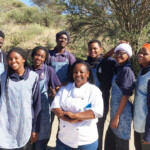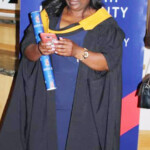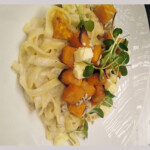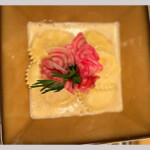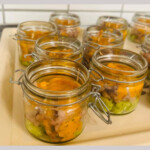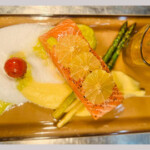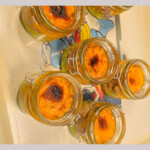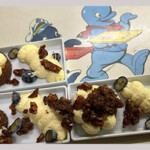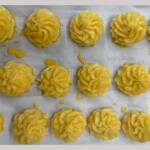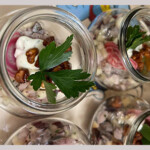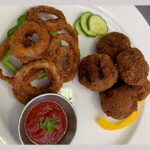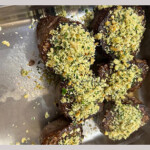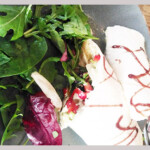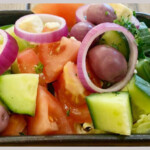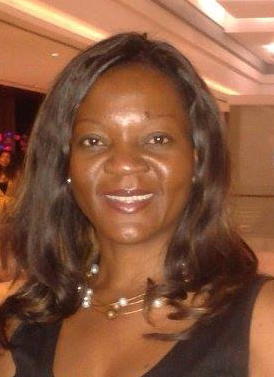by admin
Share
by admin
Share
Interview posted on 26 November 2022
It is a great honour to have Ms Maria Shinyata as a Special Guest on the Show.
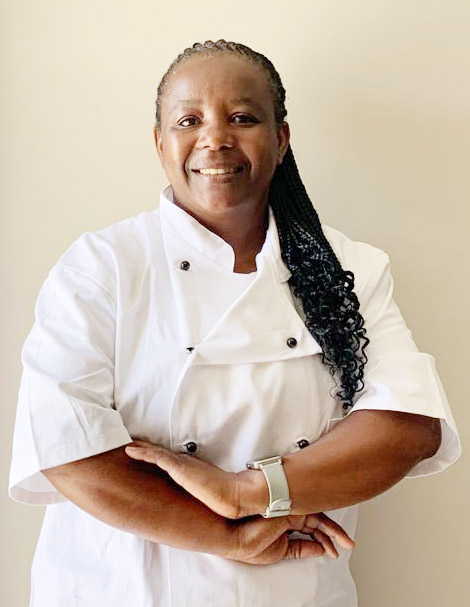
Maria Shinyata
I am Kashindi Ausiku (K) your host, right in Windhoek, the Capital City of the Republic of Namibia.
I am thrilled to welcome Madam Maria Shinyata (M), a Namibian Professional Chef to Namambe.
Welcome once again Madam Shinyata to Namambe and thank you for your time.
K: How many languages do you speak?
M: I can speak about four languages; Oshiwambo, English, Herero, Afrikaans and a bit of German which by the way is improving day by day.
K: What is your African first name?
M: My African name is Naghali, which is an Oshiwambo name given to a baby girl who was born at a time when there is a death in the family.
K: What is your favourite food?
M: I don’t have a specific food that I like, I am a confused chef.
K: Great, tell us more about yourself.?
M: I was born and raised at Okapuku Village which is just a stone’s throw away from DAPP School in Ombalantu, Omusati Region
I went for my primary school at Omahila Combined school, from grade 1 to 9. Grade10, I went to Onakayale Secondary school, still in Ombalantu.
Unfortunately I failed grade 10 and I moved to Canisinum Secondary school at Anamulenge. In fact, I went to many schools, grades 11 and 12 I attended it at Nuuyoma Senior Secondary School in Oshikuku.
My grade 12 results were not that good, so I enrolled with the Namibia College of Open Learning (Namcol) for 2 years to improve them.
After improving my results I applied at Helmut Blecks Foundation, outside Windhoek to do a 2 year Diploma in Home Science and Agriculture. They admitted me and I completed my course successfully.
I started to look for jobs and fortunately, I was afforded opportunities to work at different places. In total, I worked for14 years and then I decided again to further my studies at Namibia University of Science and Technology (NUST).
I completed my 3 year Degree in hospitality Management and thereafter I did a 2 year Diploma in Vocational Training from NUST again.
In the process, I obtained a certificate in Assessor, Moderator and instrument materials Designer.
Since I am in hospitality I needed to get all these papers to be able to contribute to the same industry at large.
I am currently a qualified hospitality Specialist and a qualified TEVT trainer in the field of hospitality. Similarly, I am also a registered Assessor, moderator and instruments Materials designer for hospitality.
K: What did you want to become when you were still at school?
M: I always wanted to work in the tourism and hospitality industry. So I am not doing this by chance, it has always been my personal choice.
K: Tell me something about your first job?
M: My first job was cleaning and cooking for the people who were working at DAPP Centre in Ombalantu.
K: What are you currently doing for a living?
M: I am currently working in Germany however whenever I am back in Namibia I work with Namibia Training Authority (NTA) doing Assessment, Moderating and Designing Materials for hospitality.
K: Currently many people are complaining that they are just sitting at home with their diplomas and degrees what is that you want to tell them?
M: In my view, these people simply need to be inspired so that they can turn the unfortunate situation around.
Of course, it is not easy, but what I can say is that, do not sit idle at home. There are many things that one can try to do in life.
If you have a qualification in a particular field and your real plan is to get a job, go and do some voluntary work to gain work experience.
It would give you leverage over those who do not have any work-related experience whenever you are invited for job interviews. Another good reason is that when you have done something in practical terms it becomes easier to understand it as opposed to only having a theory about something.
For those who are business-minded, go and start that small business that is in your mind. Do not expect the business to grow and give you a return immediately, it takes time to grow something. Be patient and trust the process. Just do it! These are just but some tips to get you going in the challenging environment.
K: What would you say are two of your biggest successes, one personal and one professional?
M: Personally, I am very happy with the decision that I took to further my studies at the university. It was something that I have been dreaming about until it became a reality. Something that looks impossible for me to achieve but I did it. Indeed, where there is a will, there is a way.
Professionally, Oh yes, I have really grown well, and I can even work internationally.
K: We are all human, and humans are emotional people, that said, what sort of things irritate you the most, which get you down, and what do you do if someone gets on your nerves?
M: Generally I am really a peace-loving person. What I have just learned about myself is that if you hurt me I can retaliate and I will keep a distance from you. The other thing with me is that I am not the type of person who can keep quiet about something that I am not happy about.
I am very honest about myself. Many people don’t really like me for being very straightforward, but I care less about that because in today’s world we have many children who find it difficult to cope with life challenges because their parents spoiled them because their parents were not straightforward with them. We should rather be open to our children and discuss issues frankly with them, it helps.
K: When I met you early this year you were telling me that you were planning to advance your skills in German. I presumed that you managed to go there and as such, I would like you to share your experience with us.
M: Yeah, Germany is a lovely country, there are good people out there. The experience so far has been amazing. I got the opportunity to interact with different people from other European countries in Germany. I did not experience any challenge at all, their work ethic is much better than here. I will talk more about my experience in Germany in the near future.
K: What is that you have seen there that we are not doing here? What impressed you the most?
M: What impressed me over there is the way how people are committed to do their work. They really mean business, they deliver their services to the best of their ability. In Namibia most of us don’t like to work hard. In short, their work ethic is very different from ours.
K: Do you think we are doing well in the hospitality industry?
M: Yes and no, in big towns like Windhoek and at the coast I can say yes we are doing fine, but in remote areas for instance at Outapi and other remote places people are simply not consistent in their business dealings. Consistency is one of the key elements to success. There are many things that I can talk about in order to empower my fellow countrymen and women in the hospitality industry.
K: Did they give you any form of certification?
M: Yes, I received a certificate, but it is written in German.
K: What is it that we can learn about hospitality from the internet?
M: You can learn many things about hospitality from the internet, but it can be a bit difficult sometimes because hospitality is practical in nature.
I have seen people trying to cook using YouTube tutorials, but their chances of producing the same results are sometimes slim and it becomes stressful too. For this reason, many people prefer learning to prepare foods through an expert who gives one-on-one training until they are familiar with many ingredients and equipment.
Indeed, one can learn more from the internet but you have to observe and watch carefully while listening to instructions. The internet as the main source of information is full of recipes that everyone from beginners to seasoned chefs.
Online sources define the hospitality industry as a multibillion-dollar industry that depends on the availability of leisure time, disposable income, and complete customer satisfaction. There are four segments of the hospitality industry: Food and beverages, Travel and Tourism, lodging, and recreation. All these include what people see or feel, housekeeping and customer service.
K: There is an expression “your health is your wealth, how do you interpret this from the perspective of the type of food that we consume in Namibia?
M: In Namibia we are almost getting there, I am quite happy that some people are in horticulture, people that have access to water grow plants and fruit trees. It is very good and that is the way to go. Certainly, if we need to live a healthy life, we must try to eat our own products, things that we produce ourselves. We should reduce our consumption of preserved food such as canned foods and sugary drinks.
Moreover, deep-fried foods are not good for the body. In general, I would say Namibians are doing well and people are becoming aware of health concerns that are triggered by the consumption of bad foods and drinks.
K: What is that you have learned from Coronavirus/Covid-19 regulations at home and abroad?
M: Apart from a lot of job loss I have learned many other things, people got really sick, some people lost their relatives, friends, and colleagues. It was extremely devastating, to say the least. The lesson I learned from there is that we need to prepare ourselves physically, emotionally, and financially for a pandemic like this one. It was really tough and the hospitality industry was negatively affected due to lockdowns and other Covid-19-related regulations worldwide.
K: What would be your advice to people who sell prepared foods to the public, what is that they need to do about the place where they operate from be it okapana, fruits etc?
M: We must begin with personal hygiene and appearance, which means that a person that is preparing food to sell to customers, needs to maintain cleanliness. If food safety and cleanliness are not maintained, consumers could become gravely ill from food poisoning and other foodborne illnesses. Wash your hands and keep your utensils/equipment and clothes clean at all time. Your personal hygiene and appearance are, the most important factors. Generally speaking, anyone who sells food to the general public must undergo training in food hygiene as well as a healthy test to determine their suitability to handle food.
Another important thing that I should not leave out is customer service. When I was in Germany I noticed that people put more emphasis on customer service as one of the most important aspects of business, particularly in the hospitality industry. People there don’t pretend when they offer you service, they would really make you feel welcome, assist you, and indicate to you that they really want you to buy their goods/services. I think for many people here at home I have a perception that we probably don’t understand what good customer service is. We appear to show some negative attitudes towards our customers. Essentially, the 3 important qualities of customer service center around three “p”s: professionalism, patience, and a “people-first” attitude. I can tell you that for instance if you work in a restaurant or hotel and you always welcome customers with an open heart, people would be encouraged to buy goods from you. It is good to give quality customer service so that that you retain customers and they will spread the word about the exceptional service that your business offer and you will get new more customers. I think we really need to pull up our socks when it comes to customer service and go benchmark training courses and visit other countries, when necessary if we are to compete on international level. It is critical to provide a clean environment to attract new customers and increase repeat traffic.
K: If you had all the money and time, what is that you will change immediately in Namibia?
M: I am going to empower the hospitality and Tourism Industry and create nice recreational places. When a person is depressed or is experiencing social challenges in life that person needs to travel to a different place and relax his or her mind instead of being at home all the time. In Namibia we still need such places that are affordable to many. Another thing I would like to change is the transport infrastructure. It is common knowledge that Namibia boasts a good road network but the country needs to introduce a modern railway network that can be used by passenger trains so that there won’t be too many cards on the road. This will also reduce global warming, especially if those trains will be electrical least we need a few trains in this country to avoid having too many cars on the road as this would also help to reduce global warming in Namibia. I have a lot in Mind.
K: Who is the person that you admire the most apart besides your parents?
M: I may have few of them but I have one person to be specific my Aunty, Meme Mariana Shalumbu. In our Culture we say (Nyokongona keshinyoko) I agree to disagree on this when it comes to her. She has been a mother to many in Windhoek and I was among the many lucky ones. Meme Shalumbu has a beautiful talent for looking after people and a golden heart. I was one of those who have really experienced the good part of her and as such, I will try to emulate her exemplary good deeds and character.
I really love her and to cut the story short as much as admire her I would like to promise her that I will always strive to maintain her legacy by keeping the door of my house open to many in order to help people who are in need of assistance especially those who want to improve their educational skills and knowledge.
The whole time I lived with her she was totally incredible, I sometimes, even brought strangers to her house, people who were seeking help but she never say aaye (no) take them back she would only say: “Adiya tu tale kutya a tu ningi ngeepi Ntowele yange (Alright my daughter we can see what we can do” my heart is at peace when I talk about her and I can get emotional. Yeah, she is a loving, kind mother who guided me and console me when I am down. I am stubborn by nature but she could see my tears and even through the phone and she would get me right. I am trying to explain how close we have been with someone who is not your biological mother. I call this true love.
K: Well I have seen the beautiful images of different food that you prepared, please tell us more about it, how much time and effort were required to prepare them?
M: It takes between 15 to 20 minutes to prepare. In most restaurants they are offered on ala carte, à la carteis the practice of ordering individual dishes from a menu in a restaurant instead of eating a fixed combination of dishes at a fixed price: You get more choice if you eat à la carte/from the à la carte menu. When you have all the ingredients you only need to prepare meat if there is meat involved then the food would be ready
K: Why do chefs wear white coats? And what is it that they need to cover their head with? How about nails? I know ladies like long nails.
M: A white chef jacket represents hygiene. Despite the fact that there are also other colours, white is preferable. A chef jacket is designed to keep the chef safe. It is made of high quality, double thick cotton, usually fire resistant. The Chef jackets and trousers are made of strong cotton material which protects the person for instance if there is a hot cooking oil spill, it absorbs the heat, and the person won’t burn easily. The chef jacket has safety buttons, meaning if you pull it, it simply comes off for safety reasons. With regard to the head, it is very important to wear something on the head because it would be very disgusting to find hair in the food. It is all about hygiene.
The nails need to be short and well-cleaned, we are not allowed to wear those long artificial nails because they are likely to contain bacteria. Even nail paints, we don’t wear them. Another item worth mentioning is the safety boots that we have to wear in the kitchen. For your information kitchens are designed to have special floors that are suitable for persons wearing safety boots. This is so to avoid people slipping or falling due to wet floors or other factors.
K: Is there anything you would like to share with our readers?
M: I compiled a book on housekeeping but at this stage, it is still in draft format, but once I finalize it I am going to share it with our readers. I hope you would do me a favour to create a link on Namambe for people to download it. Let’s share knowledge and skills for the betterment of our country and the world at large.
Thank you for the opportunity I hope the readers will learn a thing a two from this interview.
BELOW ARE IMAGES OF MARIA’S WORK…
- Maria’s first class when she became a trainer at the Waldorf School, Windhoek
- Graduation at NUST
- Item 16
- Item 15
- Item 14
- Item 13
- Item 11
- Item 12
- Item 10
- Item 9
- Item 8
- Item 6
- Item 7
- Item 5
- Item 4
- Item 3
- Item 2
- Item 1
STAY IN THE LOOP
Subscribe to our free newsletter.
Interview posted on 04 April 2023 Tuyeimo welcome to Namambe, I am excited to have you on the Show. I came across your name both online and offline countless times which made me curious to learn more about you, since the contribution that you are making to society, figuratively speaking is as good as building […]
Namambe Interview: 20 December 2022 I am Kashindi Ausiku, you Host from Windhoek, the Capital City of the Republic of Namibia. This is my last interview for the year 2022 and I would like to use this opportunity to wish all our participants and readers a Merry Xmas and a Prosperous New Year. This time […]
It is a great honour to have Mr. Ambrosius Mwetwadha Agapitus as a Special Guest on Show. Ambrosius Mwetwadha Agapitus (79) is a former Director of Education Programmes from 01/09/1990. In June 1994 he was requested to take over the responsibilities of what was known as Windhoek Education Region (in Khomas, Omaheke and Otjozondjupa political […]
Kashindi: You have a very good name, SOINI, which is common in Namibia. What does it mean and from which Language was it derived? And by the way do you have what is called traditional name Soini is the name I was baptised with, did you know that my name is Finnish? I found out […]

